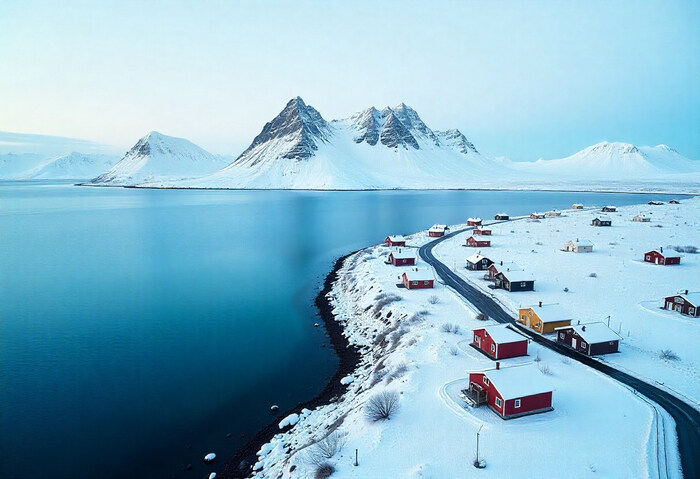Published on
September 8, 2025
Iceland has once again claimed the top spot on the Global Peace Index, outperforming major powers such as the United States, China, Russia, India, and North Korea. This unprecedented leadership stems from a unique combination of factors, including exceptionally low crime rates, strong social cohesion, and robust community trust. Unlike nations with high military spending and frequent international engagements, Iceland relies on diplomacy and social stability to maintain safety. Its comprehensive welfare system, universal healthcare, free education, and low poverty levels further reinforce peaceful living, making the country a global benchmark for security and societal harmony.
When choosing a place to live or travel, safety is often the most critical consideration. It shapes quality of life, affects economic stability, and influences overall well-being. While no country is completely free of risk, certain nations consistently emerge as safe havens for residents and visitors alike. Iceland stands out as a remarkable example, having maintained its position as the world’s most peaceful nation since 2008.
The 2025 Global Peace Index (GPI), compiled by the Institute for Economics and Peace, highlights Iceland’s continued commitment to peace. This year, the country improved its overall peacefulness by two percentage points, reinforcing its lead over other nations. The gap between Iceland and the second-ranked country is strikingly large—equivalent to the difference between the second and tenth positions—showing just how far ahead Iceland remains in terms of safety and stability.
In contrast, some of the globe’s most powerful countries struggle to achieve high rankings. The United States, for instance, sits at a surprisingly low 128 out of 163 countries on the GPI. This ranking is influenced by multiple factors, including international engagements, violent crime rates, and military expenditures.
International Conflicts and Defense Spending Shape Peace Rankings
One major factor affecting the United States’ GPI score is its involvement in international conflicts. Engagement in multiple foreign operations contributes to perceptions of instability and reduces overall peacefulness. Countries that prioritize diplomacy and limit military intervention tend to score higher, as sustained conflict is a key metric in the index.
Military spending is a key factor in shaping a nation’s Global Peace Index ranking. In 2024, the United States led the world with a defense budget of approximately $949 billion, including support to allied countries. While this level of expenditure highlights its global influence, it also signals a reliance on force over diplomacy, lowering its peace score. In contrast, countries like China, Russia, India, and North Korea maintain far smaller military budgets, underscoring the disproportionate scale of U.S. spending. Ongoing international commitments and escalating defense costs further hinder efforts to improve its position on the index.
Violent Crime Remains a Persistent Challenge
Despite recent declines in violent crime, the United States continues to report rates that are high by global standards. In major urban centers, homicide rates averaged 12 per 100,000 residents in 2024. In contrast, nations with higher GPI rankings report dramatically lower rates, underscoring the link between crime and overall safety. Comparisons show that countries emphasizing community trust, law enforcement accountability, and social cohesion enjoy far lower violent crime rates.
Iceland’s Social Cohesion Strengthens Safety
With a population of under 400,000, Iceland thrives on close-knit communities that foster strong social trust and minimize the risk of civil unrest. Its comprehensive social programs, including universal healthcare, free education, and some of Europe’s lowest poverty rates, provide a safety net that strengthens both community cohesion and individual well-being, helping to curb crime and maintain stability.
Violent crime in Iceland is exceptionally rare. Police officers typically do not carry firearms, and the nation’s homicide rate is extremely low, at just 0.54 per 100,000 residents. Stringent gun regulations—including mandatory training and highly controlled licensing—help maintain public safety, ensuring that violence remains an anomaly rather than a norm.
Minimal Military Reliance Reinforces Peace
Iceland’s unique defense strategy is another reason it consistently ranks at the top of the Global Peace Index. As the only NATO member without a standing army, the country emphasizes diplomacy and international collaboration over military force to maintain security. The GPI highlights that excessive defense spending often increases reliance on coercion, lowering peace scores, and Iceland’s approach shows that true stability and safety can be sustained without heavy militarization.
Conclusion
Iceland’s continued leadership on the Global Peace Index is driven by high social trust, robust welfare programs, low crime, and limited reliance on military force. By contrast, nations with higher crime levels, extensive military budgets, and gaps in social support struggle to achieve similar recognition. While economic power and global influence are valuable, they do not automatically translate into safety. True peacefulness, as Iceland demonstrates, emerges from a balanced combination of social, economic, and political stability, offering a model for nations striving to create safer, more secure environments for their citizens.
